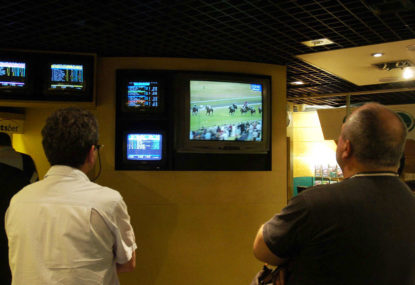TWO GOOD! Zahra wins back-to-back Melbourne Cups on Without a Fight as three horses pull up lame
Without a Fight completed the rare Caulfield Cup-Melbourne Cup double on Tuesday as star jockey Mark Zahra went back-to-back in the big one after…

Former prime minister Bob Hawke once told art critic and historian Robert Hughes, that the racetrack offers a snapshot of Australian society, adding that if you want to provide newcomers with an understanding of egalitarianism, take them to any racetrack around the country.
This is where you will find the many faces that make up the nation’s character.
The city track sits in sharp contrast to the rural track, especially in spring. Visit a metropolitan racetrack during Melbourne’s spring racing carnival and you will find corporate types, celebrities, promotion girls, women in fancy frocks, suited young men, power couples dressed in their finest, and a motley array of international VIPs congregating in the ‘birdcage’ and marquee zones under the spectre of corporatism.
You will also find partygoers who see the track as nothing more than an all-day rave venue. It is no surprise that families, social punters and purists are staying away from the city racetracks in spring, as reflected in this year’s Cox Plate crowd figures.
I prefer to visit the country track on the V/Line train with my dad in autumn and winter. This is where you can enjoy the town and engage with it’s people without fuss, much like perusing a family run rural shop that trades in curious old magazines, obsolete devices of yesteryear, and discarded heirlooms.
I am equally at ease in my local betting pub, where many of the locals congregate for a beer, a bet and a yarn. Far more satisfying than an outer suburban mega-gaming lounge where lone gamblers sit transfixed before swirling screens for hours without noticing the person beside them.
If the racetrack mirrors Australian society, then the local family run betting pub or suburban TAB reflect the neighbourhood, as it did when I was growing up in a cultural diverse Melbourne working class suburb in the ’70s.
On Cup day, the entire neighbourhood seemed to descend on the local TAB hours before the cup runners jumped. There was the grumpy man from two doors down, the school teacher from the local primary school and there was the overweight spinster who usually placed her bets through an SP bookie via the public telephone at the end of the street.
There was the school bully standing obediently beside gran, the station master in his VicRail uniform, the butcher in his blood smeared smock, the single mum with her toddler and the pretty girl from the other side of the rail track.
The were the local thugs on their bikes, the war veteran with the missing leg and and the lone drunk.
And as they shuffled towards the betting counter in queues that spilled onto the pavement, the grumpy man would ask the bully’s gran if she fancied anything. The schoolteacher would turn to the stationmaster for information on the Cup day train schedule. The butcher would inform the spinster on the arrival of this season’s spring lamb. The Greeks and Italians would exchange tips in broken English and the local hoods would circle the TAB on their bikes.
Horse racing speaks to us in many ways. And it primarily spoke to me through its callers. My favourite race caller was Bill Collins. I have fond memories of Collins calling the harness racing during ‘The Penthouse Club’ on Saturday nights, a variety television show hosted by Mary Hardy and Michael Williamson in the 70s.
Collins would appear in a live cross-over from the caller’s booth in Moonee Valley a few minutes before each race to give his tips, and my dad would duck down to the TAB with me in tow to place a bet and return in time to watch with the family the pacers run.
This was his way of ensuring that punting remained a communal affair.
On one Saturday evening, I remember a lone punter who always stayed at the TAB well after the regulars had left giving me advice that has stayed with me. He shuffled towards me, stooped to meet my eyes and spat out in a smoked-affected voice, ‘Don’t ever bet alone, son!’
Not bad advice in light of the problems associated with on-line betting today. Digital devices are essentially designed to set the social punter on the path to solitary gambling. As any punter with a digital device knows, corporate bookmakers are constantly offering deals and incentives designed to divorce the punter from his or her community.
No need to leave the house or engage with anyone beyond the front gate. Just tap your pad for instant success.
If you want to bet responsibly, bet in the company of friends, family or neighbours. I will rarely punt without my dad beside me at a country track, or without my punting buddies within earshot of laying a bet at the local pub on a Saturday afternoon.
This is my way of heeding the advice that the lonely punter issued many years ago.
Chris Fotinopoulos is a Melbourne writer and teacher.